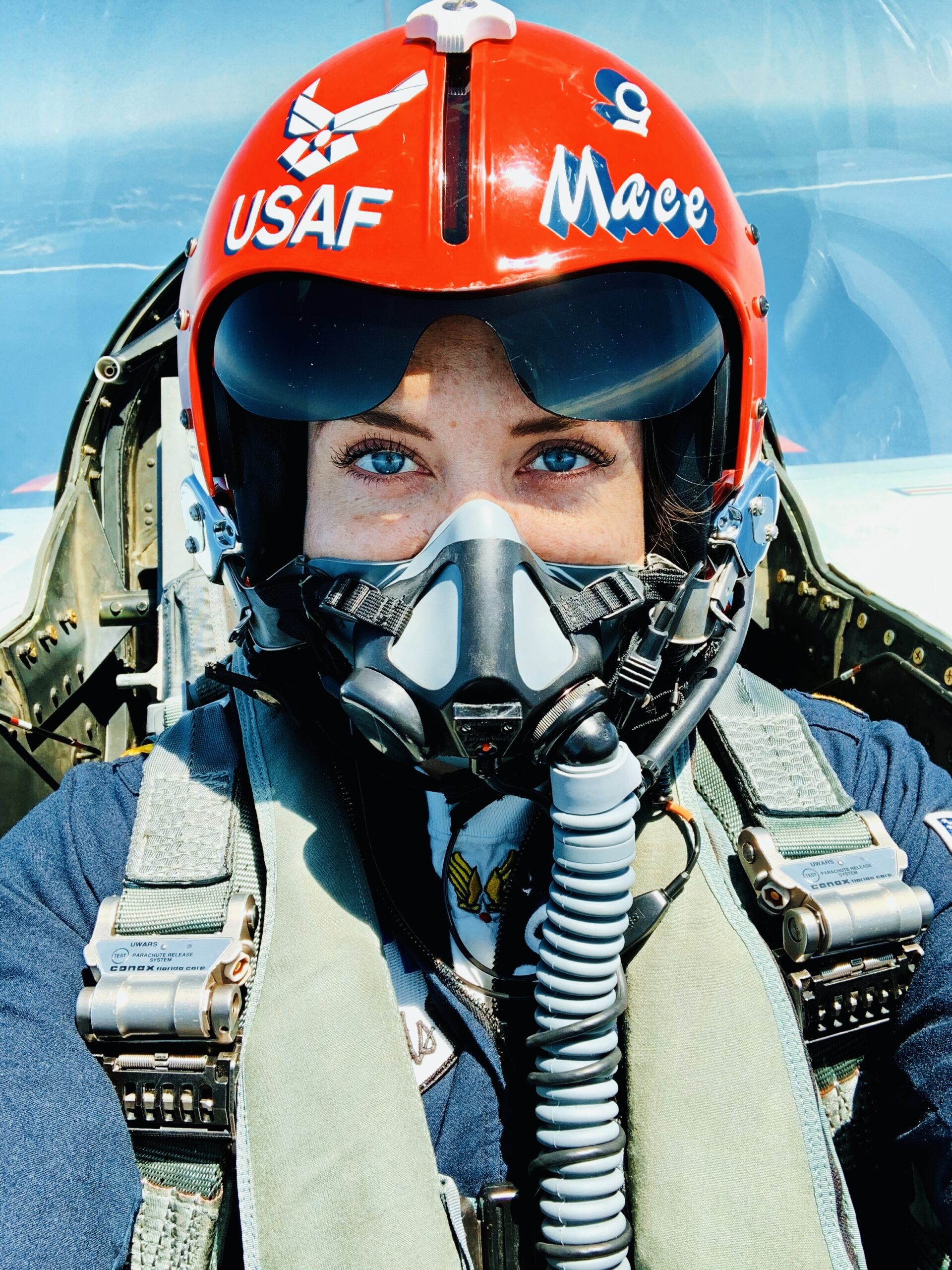Featuring: Michelle “Mace” Curran, former Thunderbird fighter pilot & author of The Flip Side
The first time Michelle Curran blacked out in a fighter jet, she thought she might die.
She was 25, just a few flights into her first deployment in Japan, trying to prove she belonged among the best pilots in the world. Determined to “win” a mock dogfight, she pulled too hard on the throttle, hit nine times the force of gravity, and lost her vision.
For a few seconds, everything went dark.
When her vision returned and her instructor called an end to the exercise, she realized what had just happened. She’d flown faster than the speed of sound — by accident — and nearly lost consciousness mid-air.
That mistake earned her the call sign “MACE” — short for Mach at Circle Entry. It also taught her her first unforgettable lesson: you can’t out-perform self-doubt, you can only learn from it.
The Weight of a Name
“People think call signs are glamorous,” Michelle told me during our conversation. “But you don’t pick them. You earn them — usually for something dumb you did.”
She laughed when she said it, but there was more beneath that story: pressure, belonging, and the silent question every perfectionist knows too well — am I enough?
Like most high achievers, Michelle had learned early that competence equals worth. That belief pushed her through pilot training, where she was often the only woman in her class, and into a career few people — male or female — ever reach.
But it also came with an undercurrent of exhaustion and constant vigilance.
“When you’re trying to belong, it’s hard to show up as your whole self,” she said. “Especially when everyone in the room is waiting to see how you’ll react.”
Lessons in Mistakes and Mastery
I asked how she learned to stay calm in the cockpit after that near-blackout moment — how she managed mistakes when the stakes were literally life or death.
“Compartmentalization,” she said. “You can’t afford to spiral in the middle of a flight. You make a mistake, you acknowledge it, and you move on.”
Later, she added something softer.
“But afterward, you always debrief. You own it without shame. It’s not, ‘I failed,’ it’s, ‘I learned.’”
That separation — between error and identity — is what allows fighter pilots to get better instead of paralyzed.
And maybe, she suggested, it’s what the rest of us need too.
Belonging in a Male-Dominated World
When Michelle began her training, only about two percent of fighter pilots were women.
She didn’t think much of it at first — until one classmate told her she’d only get a fighter assignment to “check a box.”
She was stunned. She’d been at the top of her class, outperforming many of her peers, but suddenly it didn’t matter.
“I went home that night furious,” she said. “And the next day, I had my best flight ever. Not to prove him wrong — but to remind myself that I could.”
Still, the subtle messages of not belonging continued. Every off-hand comment, every pause in the room when she entered, every moment she was made to represent all women everywhere — it was, as she put it, death by a thousand paper cuts.
It took years for her to realize that other women weren’t competition; they were her allies.
“There’s space for all of us,” she told me. “When you reach out, you realize you’ve been craving that connection all along.”
Courage Isn’t the Absence of Fear
At some point, Michelle became one of the few women ever to fly with the U.S. Air Force Thunderbirds — performing in front of millions at 500 mph, sometimes just 50 feet from another jet.
She also experienced near-misses, like the time she almost collided with another pilot mid-show. In those moments, fear isn’t optional.
But courage, she said, isn’t the lack of fear — it’s learning to pause before you react.
“You can’t control what happens,” she said. “But you can control the space between the panic and your response.”
That pause — that single breath — is the difference between chaos and composure.
The Flip Side of Fear
When Michelle left the Air Force, she thought her hardest lessons were behind her. Instead, she found herself learning all over again — how to rest, recover, and redefine success outside of the cockpit.
“High performers are great at pushing,” she said. “We’re not so great at recovering.”
Now, she teaches people how to invert fear, build confidence, and lead with curiosity instead of control — lessons she shares in her book, The Flip Side: How to Invert Your Perspective and Turn Fear Into Your Superpower.
“Progress doesn’t come from perfection,” she told me. “It comes from the courage to start — even when you don’t feel ready.”
If You’re Standing on the Edge…
If you’re staring at your own version of a runway — a dream, a pivot, a leap — and your inner critic is loud, Michelle’s advice is simple:
Start anyway.
“The people you admire didn’t wait until they were ready,” she said. “They just started and figured it out along the way.”
You don’t have to be fearless to be brave.
You just have to believe you’ll figure it out once you take off.
Explore More
If this story resonated with you, explore my favorite tools for emotional resilience and intentional living at
👉 livingxo.com/resources
Connect with MACE here

+ show Comments
- Hide Comments
add a comment